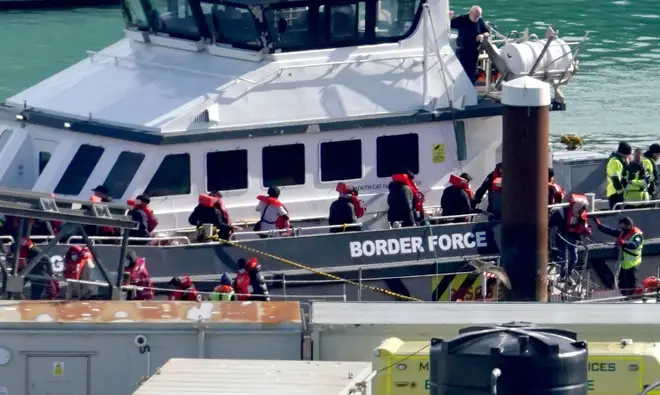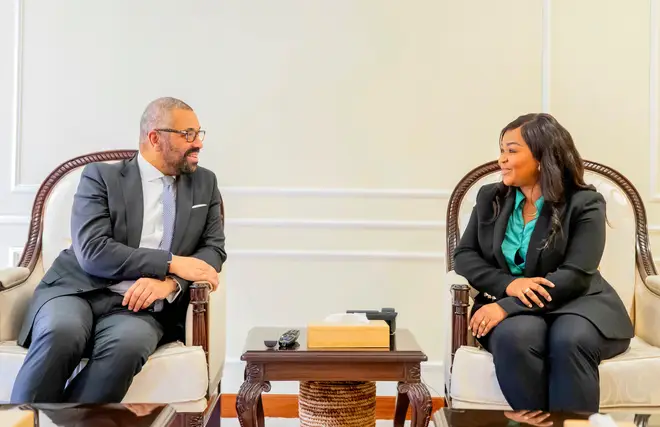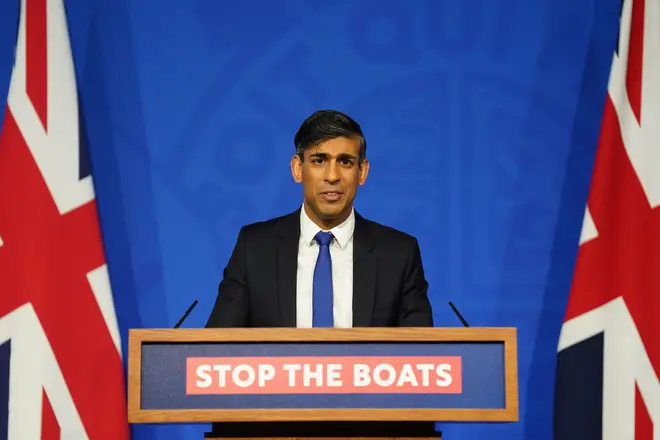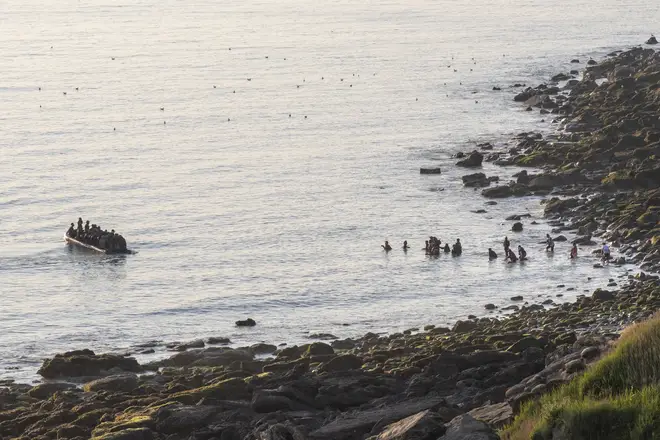
Nick Ferrari 7am - 10am
4 March 2024, 19:55 | Updated: 4 March 2024, 23:29

The government has suffered a series of defeats in the House of Lords over its Rwanda plan.
The plan, which would see people coming to live in the UK without permission deported to Rwanda, was amended five times by the Lords on Friday evening.
Changes include allowing the assumption that Rwanda is a safe country to be rebutted in the courts, making sure that the east African nation cannot be declared safe until a treaty has been signed and can be properly monitored, and has to be fully compliant with UK and international law.
Several of the amendments were backed by a margin of over 100 votes - representing a large defeat of the government.
Former Tory Cabinet minister John Gummer, now known as Lord Deben, told peers in Westminster: "In all the years as a minister and as a Member of Parliament, I never told a public lie.
"And I am being asked here to tell a lie, because the Government has told us that Rwanda is not a safe place at the moment, but is going to be a safe place. But they are asking us to say it is a safe place now."
Read more: Rwanda scheme could cost taxpayer more than £500m, watchdog report finds

'I will fight the Rwanda bill until the very end' former Conservative Party Chairman tells Marr
He added: "All the government has done is to say 'we have signed an agreement, that agreement is going through and we are in the course of ensuring that agreement is carried through in Rwanda'.
"What I want to be able to do is to say: 'Rwanda would be a safe place, if all these things are carried through'. And I want to make sure there is a mechanism for checking that... and we need to have a mechanism that, should the situation alter, we would be able to deal with that.
"Will you allow us to say that Rwanda is a safe place when you can provide the information to allow us to tell the truth? For goodness sake, let's tell the truth."
These amendments will not necessarily make it into the version of the bill that becomes law, as MPs and peers will go through the 'ping pong' process between themselves to come up with the final draft.
The government has been trying to pass a version of the Rwanda bill since 2022 as part of its plan to stop small boat crossings over the English Channel.

In 2023, the plan was declared unlawful by the Supreme Court. Ministers came back with a revised version of the planr that passed three readings in the House of Commons.
The government said earlier that it wants to have the first flights take off for Rwanda by Easter - the end of March - which appears unlikely now.

It comes after a watchdog revealed that the Rwanda bill could cost the taxpayer more than £500m.
The report from the National Audit Office (NAO) said last week that the plan could cost a total of £576.8m if just 300 asylum seekers are sent to Rwanda.
This would amount to around £1.8m million per person sent to the east African nation and account for just 1% of the UK’s asylum seekers, according to the National Audit Office.
No asylum seekers who have arrived in the UK by unauthorised means have been removed to Rwanda under the Tory policy as of yet.
The bill has faced a series of legal challenges in recent months, but the Prime Minister has said he wants flights to start "as soon as practically possible".
The NAO investigated the Rwanda plan's costs between January and February after the chairs of the Public Accounts and Home Affairs committees raised concerns about the lack of information available to Parliament.
Previously, the Home Office has refused to reveal the full costs of the deal due to “commercial confidentiality”.
So far, the Government has paid Kigali £220 million under the Economic Transformation and Integration Fund designed to support Rwanda's growth.
It will fork out another £50 million to Rwanda this year and every April after until 2026.
The report also found that in addition to the £220 million already paid to Kigali, the Home Office will also spend up to an additional £150,000 per individual relocated to Rwanda for 'processing and operational costs'.
These fees will be split into annual sums that will be paid for up to five years, meaning it could bring the total figure spent on each person up to £150,000 by the end of the five-year period.
The initial five-year deal runs to April 2027, meaning payments could potentially continue until 2033.
If an individual decides to leave Rwanda, the UK would stop payments for that person but still give Rwanda a one-off £10,000 to assist with their departure.
The Home Office has estimated that one in 10 will voluntarily leave Rwanda after being relocated.
Labour has hit out at the report as a “national scandal”, as shadow home secretary Yvette Cooper said: "This report reveals the national scandal the Tories have been trying to hide. Its shocking analysis shows the costs of the failed Rwanda farce are even higher than previously thought.
"In order to send less than 1% of UK asylum seekers to Rwanda on a few symbolic flights, the taxpayer will be forced to fork out over half a billion pounds - with no ability to recover any of the money already sent. This is the equivalent of nearly £2 million per person sent.
"Rishi Sunak has staked his position on this scheme. He must account for this fiasco."


Reacting to the watchdog’s report, critics slammed the Home Office over the "staggering figures".
Home Affairs Committee chairwoman Dame Diana Johnson said: "These are staggering figures. For all its rhetoric about ensuring value for money in the asylum and immigration system it is unclear how schemes such as Rwanda or Bibby Stockholm achieve that. Huge initial outlay and ongoing costs raise serious questions about how this can be cost-effective, even compared to high hotel accommodation costs.
"What we are left with is a very expensive programme the Government hopes may offer a deterrent to those seeking to cross the Channel in small boats. Yet, there is little evidence for this either.
"This also does little to allay the serious concerns ... about the lack of openness on the cost implications of the Rwanda scheme from the Home Office. For a scheme whose importance is apparently self-evident, we would expect the evidence base to be far clearer, not presented in dribs and drabs and getting worse every time."
A Home Office spokesperson said: "It is vital we respond to illegal migration with bold, long-term solutions. Our Partnership with Rwanda offers just that.
"Doing nothing is not without significant costs. Unless we act, the cost of housing asylum seekers is set to reach £11 billion per year by 2026. Illegal migration costs lives and perpetuates human trafficking, and it is therefore right that we fund solutions to break this unsustainable cycle.
"We have a strong relationship with Rwanda and both sides remain absolutely determined to deliver on this Partnership. Once the Safety of Rwanda Bill and Treaty are in place, we will focus on getting flights off the ground."